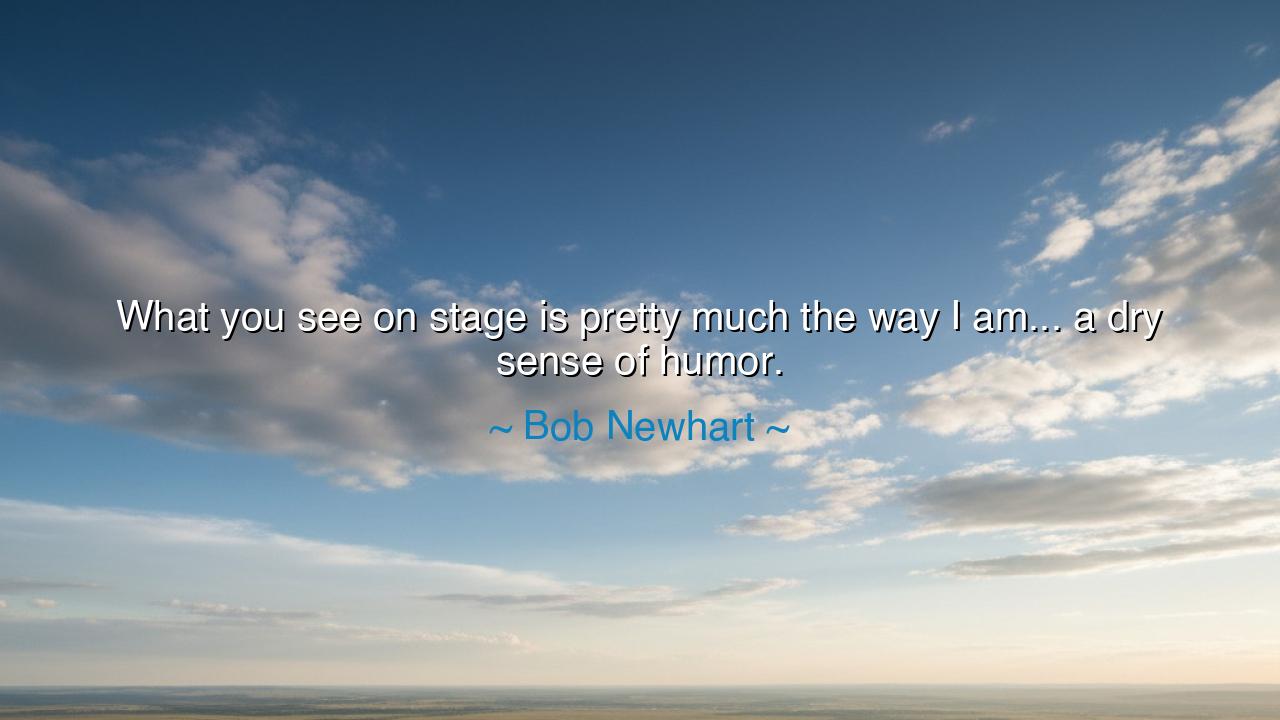
What you see on stage is pretty much the way I am... a dry sense






In the timeless dance of wisdom, where the heart and mind intertwine in harmony, there exists a force both subtle and powerful—humor. It is not a loud proclamation or a dramatic spectacle, but a gentle whisper, a reflection of the truth, and often the most profound of truths. The great Bob Newhart, a master of this subtle art, once spoke the following words: "What you see on stage is pretty much the way I am... a dry sense of humor." In this simple declaration, Newhart revealed something powerful—that humor is not an external mask, nor a carefully crafted performance, but an authentic expression of the self. It is the manifestation of one’s true nature, not loud and exaggerated, but quiet, restrained, and deeply insightful.
In the ancient teachings, we see that the greatest wisdom often comes not from the loud declarations of the public stage, but from the quiet, introspective moments. Socrates, the great philosopher, spoke not with bombast but with a quiet irony that cut through the noise of his time. His method of teaching was not to shout truths from the rooftops but to engage in dialogue that gently led his disciples to deeper understandings of the world. Humor, as he practiced it, was not the humor of spectacle, but of subtlety—a dry humor that sought to reveal the absurdities of life through quiet reflection. It was humor born not of excess, but of an awareness of the world’s contradictions and paradoxes. In this way, Newhart’s humor is not merely a performance; it is a reflection of a deeper, more authentic self.
The essence of dry humor is found in its simplicity and restraint. It does not seek to command attention but invites the audience into a shared space of quiet understanding. Consider the Stoics, those ancient thinkers who embraced the art of living with clarity, focus, and grace. Marcus Aurelius, the philosopher-king, wrote with a wisdom that often carried an undercurrent of dry humor—an acknowledgment of the absurdity of human striving, an understanding that we are but small parts of a vast and ever-changing world. His humor was never loud or flashy; it was in the quiet reflection on life’s fleeting nature that his greatest insights were revealed. Newhart, too, understands that humor does not have to be grand to be powerful—it is in the dry, understated delivery that the greatest truths are often found.
In the ancient tales, we often encounter humor woven into the very fabric of wisdom. The comedian is not the fool, but the wise observer, who through wit and irony reveals the very nature of the world. Aristophanes, the playwright of ancient Athens, used humor not for mere amusement but as a tool for social and political commentary. His humor, though lively, carried with it a subtle, dry undercurrent—a quiet critique of society’s failings. Newhart’s humor is similarly an invitation to look beyond the surface, to see the world not through exaggerated gestures, but through clear eyes, recognizing the contradictions and inconsistencies that shape our lives. It is the kind of humor that, like the ancient sages, calls us to pause, reflect, and laugh at the absurdity of existence itself.
In a world that often demands louder voices and grander performances, Bob Newhart teaches us that true humor does not come from the spectacle but from the authenticity of the individual. To live with a dry sense of humor is to embrace one’s true self and to share that self with the world in the most sincere and unassuming manner. It is to be both present and observant, seeing the humor in life’s smallest moments without needing to embellish or exaggerate. The greatest wisdom and humor are often born from this simplicity—a recognition that the world, in all its chaos, is often more humorous in its contradictions than in any performance we could craft.
The lesson we take from this ancient wisdom, and from Newhart’s words, is clear. In our own lives, we must seek to live with authenticity—not seeking to impress with spectacle or grand gestures, but finding the truth in the quiet, dry humor of everyday existence. We must embrace the subtle, understated aspects of life and, in doing so, uncover the absurdities and ironies that are often the most revealing. Like Newhart, we must learn to find joy not in excess, but in restraint and clarity, and share that joy with others not through performance but through the simple act of being true to ourselves.
So, let us walk through the world with this wisdom in mind. Let us embrace the dry humor that lies within us all, the humor that does not shout but gently reflects the truths of our existence. Let us live authentically, observing the world with a quiet understanding, and in doing so, may we bring to others the gift of laughter—not through exaggeration or spectacle, but through the profound simplicity of truth and self-awareness. For in this, we shall discover that the greatest humor is not that which demands attention, but that which flows from the heart of a life well lived.






AAdministratorAdministrator
Welcome, honored guests. Please leave a comment, we will respond soon